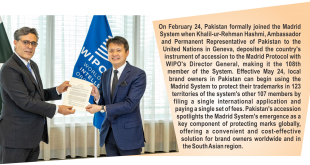By: Jawaid Bokhari
The dynamic of conspicuous change — or strategic direction — is noticeably reshaping the landscape of ownership of assets and businesses, and redefining the role of a wide range of economic agents in the economy.
No less then 97pc of the highest recorded 926 companies registered in the month of May with the Securities and Exchange Commission of Pakistan were private limited companies (86pc) and single member companies (11pc).
Around 885 private limited firms incorporated in just 30 days far exceeds 559 public companies listed on the Pakistan Stock Exchange which stood at 560 in May 2016.
In overall terms less than 50 companies are reported to be ‘active’ with good free-float of shares and about 25-30 firms come up for regular trading.
This also represents the global trend. The number of companies quoted at the American stock exchanges has slumped by 50pc since 1996 owing to consolidation, and because talented managers prefer to stay private, say experts.
On the other hand the number of newly registered public companies (unlisted) in Pakistan is so nominal that the SECP lumps them with such strange bedfellows as non-profit associations and trade bodies, or such peers as foreign companies, which put together constitute only 3pc of the numbers recorded. There are 106 companies which were registered in ‘other sectors.’
In May as many 89 IT companies were incorporated; with service sector in the lead with 136, followed by trading 129 and construction firms 114
The changing investment trend is gaining momentum virtually every month. As many as 13 foreign companies were registered in May in Islamabad, Karachi and Faisalabad while foreign investment was reported in 75 new companies from as many as 17 countries around the world.
The FDI level will actually be known when companies with foreign investment or joint ventures go into operation.
While multinational companies operating in Pakistan have been investing their retained earnings, according to trade bodies, the taxation regime is eroding their business confidence.
Some multinationals have resorted to strategic disinvestment and withdrawn from the Pakistani market with parent companies trying to consolidate business at home in the wake of the global financial crisis.
While the CPEC-related Chinese investment is picking up, the overall capital inflows from traditional sources is shrinking.
Quite a sizable chunk of CPEC- investment is being made by state-owned Chinese companies while infrastructure projects are also being co-funded by the government of Pakistan.
This development has to be seen in the context of the growing role of the state in economic development: rising pace of public sector investment versus stagnant or falling share of the private sector when measured as a ratio of GDP.
In the current fiscal year private sector capital spending has dropped to 9.9pc from 10.2pc of the GDP last year. The target for FY 2017-18 is 11.2pc which may or may not be met.
Contrary to this, the public sector investment (including PSDP) has gone up to 4.3pc, up from 3.8pc of last year and is forecast to rise to 4.5pc of the GDP in the next fiscal year.
And all this is happening while adhoc-ism at the federal level is weakening public sector institutions.
As a media report goes, the government funded projects are being executed largely with no ‘full-time’ directors.
Instead the chiefs, deputy chiefs and heads of concerned sections of the planning commission, besides their normal duties, have been made responsible for monitoring the progress of projects.
In this scenario, one has also to look at the strategic sale of state enterprises, which has virtually remained frozen for the past decade or so, but for the disinvestment of minority shares held by the government in the already privatised state banks and other state units.
Many see major bleeding state enterprises as strategic assets or a symbol of collective ownership rather than what they actually are: inefficient bureaucratic capital at work.
Yet another issue is of employees’ redundancy including professionals and skilled manpower that need to be provided alternate jobs.
Finally, privatisation has lost much of its gloss because of the faulty ways in which earlier state assets were sold with little productive outcome. That has strengthened the political opposition to privatisation of which PPP is at the forefront.
Pakistan signed an agreement last week with ADB for another $300m to make public sector enterprises efficient and cost effective.
But a more significant and far reaching development in the corporate sphere is the upsurge in the number of IT companies being registered with the SECP. They have acquired the third or fourth leading position in monthly incorporated numbers.
In May as many 89 IT companies were incorporated; with service sector in the lead with 136, followed by trading 129 and construction firms 114.
To quote the London Economist these IT companies (start-ups) are pioneering a new organisational form and reinventing companies “where rights and responsibilities are meticulously defined. … Founders, staff and backers exert control directly.
“… and their performance indicators measure as to how many products they have produced rather than elaborate accounting standards…Investors usually insist that management and often employees, own large stakes to ensure that their interests are aligned to the success of the venture.”
Despite its problems, “the insurgent economy is going mainstream” in developed economies like the United States.
Anecdotal evidences suggest that things are moving in a similar direction in Pakistan though the country suffers from a huge lag in application of IT technology for upgrading its economy.
However, the surge in IT companies being registered by the SECP raises hope that the process now will be much faster than in the past.
Looking at the big picture is capitalism reinventing itself?
Source: https://www.dawn.com
 Jahangir's World Times First Comprehensive Magazine for students/teachers of competitive exams and general readers as well.
Jahangir's World Times First Comprehensive Magazine for students/teachers of competitive exams and general readers as well.



